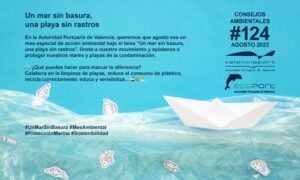
- In 2023, the companies adhering to Ecoport II – an environmental improvement programme aimed at port companies promoted by Valenciaport – increased waste recovery by 75% with a total of 2,025,434 kg of waste reused
- 32 companies operating in the areas managed by the Port Authority of Valencia (PAV) are participating in the Ecoport II initiative
- The objectives achieved also include a reduction in the consumption of water, energy and fuel
- The companies of the port community that make up the Ecoport II group, as well as complying with the environmental objectives set, have carried out a self-diagnosis of their compliance with the SDGs
València, 24 April 2024.- A 100% green port implies that the companies working in the port join the zero emissions environmental strategy of the area in which they operate. And this is precisely the objective of the Port Authority of València (PAV) which, in parallel to the development of its own environmental actions, encourages the companies working in the Valencian docks to develop their own initiatives through the Ecoport II group.
Thanks to the work of Ecoport II, last year, the companies involved in this environmental programme increased waste recovery by 75% with a total of 2,025,434 kg converted into useful material (either energy or new raw material).
In 2023, the 32 participating companies voluntarily formulated nine environmental objectives: waste recovery; reduction of water consumption (they managed to reduce it by an average of 13%, equivalent to 1,921,504 litres); lower fuel consumption (a reduction of 8% on average for each company, which represents a total of 20,763,695 litres); lower electricity consumption (with an average reduction for each company of 13%, equivalent to 23,468,764kw/h); use of alternative energy sources (some examples are the deployment of solar panels, the use of electric vehicles, the development of a photovoltaic plant with storage batteries or the use of hydrogen); calculation of the carbon footprint; participation in environmental initiatives; promotion of the circular economy (use of plastics and waste water from the car wash and installation of electric air conditioning in vehicles); and training and awareness-raising (a total of 4,428 man-hours have been used, over the total number of workers that make up all the companies).
The companies that form part of Ecoport II
The companies that make up the Ecoport II group are 32: Amarradores del Puerto de Valencia, S.L., APM Terminals Valencia, Autoridad Portuaria de Valencia, Baleària Eurolineas Maritimas, S. A., Centro Portuario de Empleo de Valencia, S.A, COSCO SHIPPING Lines (Spain) S.A, Productos Asfálticos, S.A.(CEPSA), Fertiberia, S.A., Galp Energía España, S.A.U., Garbaport, Infoport, Intersagunto Terminales, S.A, ID Logistics Iberia, MSC Terminal Valencia, S.A., Navarro y Boronad, Noatum Terminal Sagunto, CSP Iberian Valencia Terminal S.A.U, Portuaria Levantina, S.A. (PORLESA), REFIT & REPAIR, Remolcadores Boluda, S.A, Planta de Regasificación de Sagunto, S.A. (SAGGAS), Infraportva S.L.U., Terminales Portuarias, S.L. (Tepsa), , Transportes Remedios Torres, S.L., Seroil-Reciclamas, Sertego Puerto de Valencia, Servmar Balear, Toyota Logistic Services España, S.L , Trasmed, Valencia Terminal Europa S.A. (VTE), Vareser96, S.L, y Velas Lluch.
Self-diagnosis of the SDGs
In parallel to these actions, the companies that form part of the Ecoport II working group have carried out a self-diagnosis of the SDGs, identifying them and the specific actions they are carrying out under their umbrella. Among the 17 Sustainable Development Goals, the ones selected by most of the companies were:
SDG 5.- GENDER EQUALITY. Achieve gender equality and empower all women and girls.
SDG 6.-CLEAN WATER AND SANITATION. Ensure availability and sustainable management of water and sanitation for all.
SDG 7. AFFORDABLE AND NON-POLLUTANT ENERGY. Ensure access to affordable, secure, sustainable and modern energy.
DECENT WORK AND ECONOMIC GROWTH. Promote sustained, inclusive and sustainable economic growth, full and productive employment and decent work for all.
SDG 9. IDUSTRY, INNOVATION AND INFRASTRUCTURE. Build resilient infrastructure, promote sustainable industrialisation and foster innovation.
ODS 12. RESPONSIBLE CONSUMPTION AND PRODUCTION. Ensure sustainable consumption and production patterns.
SDG 13. climate action. take urgent action to combat climate change and its impacts.
SDG 14. Conserve and sustainably use the oceans, seas and marine resources to achieve sustainable development. Given the results obtained, on a voluntary basis, by all the participating companies, the year 2023 has meant a qualitative and quantitative improvement in the state of the environment in the ports managed by the PAV.

